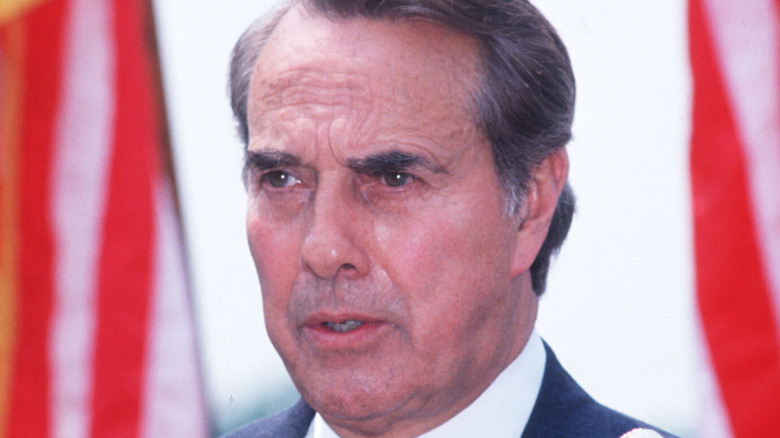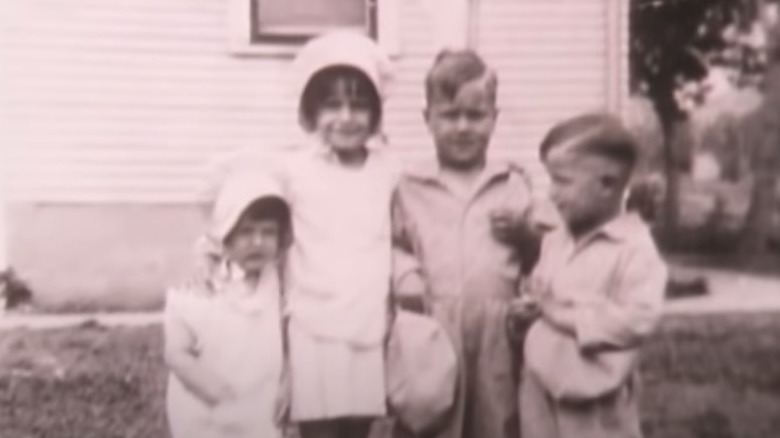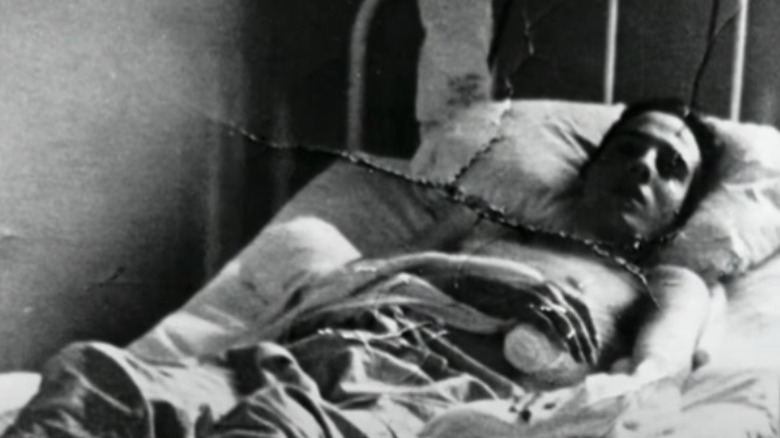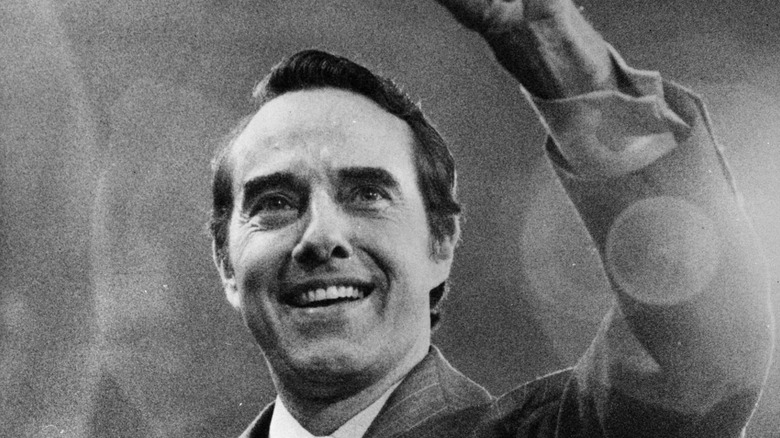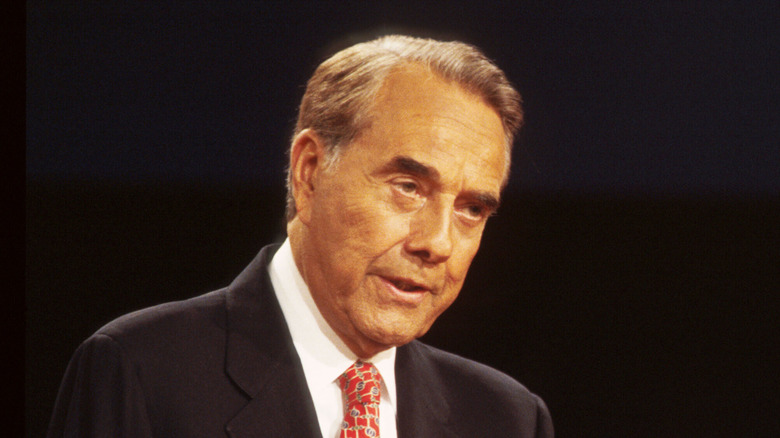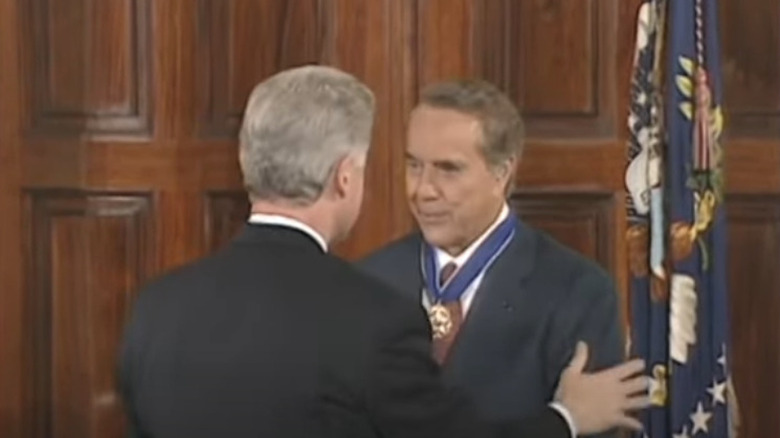The Untold Truth Of Bob Dole
We may receive a commission on purchases made from links.
Bob Dole, a Republican Party mainstay and the party's 1996 presidential nominee known for his plain-spoken conservatism, died in the early morning hours of December 5, 2021, The New York Times reported. "It is with heavy hearts we announce that Senator Robert Joseph Dole died early this morning in his sleep," the Dole family stated, noting that "he had served the United States of America faithfully for 79 years" (via NPR). Dole was 98 years old. For decades, Dole was the top Republican serving in the Senate, but his political career ended with an unsuccessful run for the White House against Bill Clinton in 1996.
The Dole family did not say where he died, nor did the announcement mention the cause of death. However, the former senator announced in February that he was being treated for advanced lung cancer. In recent decades, Dole suffered a series of health ailments, per CNN. In 1991, he underwent surgery for prostate cancer. A decade later, he received abdominal aortic aneurysm surgery. In 2005, he was hospitalized after a fall in his home, and he was treated for a leg infection in 2009.
Bob Dole came from humble beginnings
Robert Joseph Dole was born on July 22, 1923, and grew up poor in the Dust Bowl of Great Depression-era Kansas, according to The New York Times. He was the second of four children (pictured above) born to Doran and Bina Dole of Russell, Kansas, a small town on the plains of western Kansas. Doran ran a stand that sold eggs and dairy products, while Bina sold Singer sewing machines and vacuum cleaners as a traveling saleswoman. The two struggled financially, but preached the merits of hard work. To make ends meet, per The Washington Post, Dole's parents moved the family into the basement of their house, so they could rent out the main part of the home to oilfield workers.
His parents also gave him a strong religious upbringing, which became a theme in his political life. "As a young man in a small town, my parents taught me to put my trust in God, not government, and never confuse the two," Dole said during his speech when he announced he was running for president (via The American Presidency Project). During his youth, Dole was a member of the Boy Scouts, delivered newspapers, and worked as a soda jerk at the local drugstore, per USA Today. But as an athlete, it was Dole's love of sports — especially basketball — that would help him get into college at the University of Kansas, according to the Chicago Tribune.
World War II changed Bob Dole's life
After his freshman year, Dole enlisted in the U.S. Army to fight in World War II. On April 14, 1945, just weeks before the Nazi surrender, Dole's platoon came under attack in Italy. While they tried to take out Nazi machine gunners, Dole was struck in the back. "As the mortar round, exploding shell, or machine gun blast — whatever it was, I'll never know — ripped into my body, I recoiled, lifted off the ground a bit, twisted in the air, and fell face down in the dirt," he wrote in his 2005 memoir, One Soldier's Story.
Dole said he was unable to get up, and for several minutes, he wondered if he was even alive. "I didn't know it at the time, but whatever it was that hit me had ripped apart my shoulder, breaking my collarbone and my right arm, smashing down into my vertebrae, and damaging my spinal cord," he wrote. He was paralyzed below the neck, fully expecting to die.
An embittered Dole stayed at a military hospital in Michigan for more than two years, per The Washington Post. Yet, it was an orthopedic doctor in Chicago who helped change Dole's perspective on the fact that he would permanently lose the use of his right arm and hand. "[The doctor] inspired me to focus on what I had left and what I could do with it, rather than complaining about what had been lost," Dole wrote.
Dole got his start in politics as a student
Bob Dole was finally able to leave military hospitals in May 1948 to begin the next stage of his life, moving to Tucson to attend the University of Arizona. He fully immersed himself in his studies, and a year later, Dole was admitted into a dual bachelor's and law degree program at Washburn University in Topeka, where a professor encouraged Dole to go into politics, per PBS. He took the message to heart, running for office while he was still a student at Washburn and winning a seat in the Kansas House of Representatives in 1950.
Instead of seeking reelection, he returned to his hometown of Russell and set a different path forward by taking the county attorney office before winning his first race for a seat in the U.S. House of Representatives in 1960, according to The Kansas City Star. Dole won reelection twice more before running for Senate in 1968, where he remained for the rest of his political career, becoming the GOP's top senator along the way.
Although he rarely abandoned his conservative values, Dole is known as one of the most durable political personalities of the last several decades because of his pragmatic approach by reaching across the aisle to compromise with Democrats. "To me, he was also a friend whom I could look to for trusted guidance, or a humorous line at just the right moment to settle frayed nerves," President Joe Biden said of Dole (via The White House).
Bob Dole's ever-present pen was a matter of politics
Bob Dole's World War II wounds were extensive, and some he never recovered from. After seven surgeries and extensive physical therapy, he never regained the use of his right arm and hand. Daily life was a struggle. "For nearly a year, I couldn't feed myself. I had to learn to walk and dress myself all over again," Dole told The Topeka Capital-Journal (via USA Today).
Dole's inability to use his right hand became a sensitive point when he joined the world of politics. On the campaign trail (and on a daily basis in office), handshakes are a type of currency. But it was immensely painful for Dole when people would eagerly grab his right hand. As a matter of preemptive defense, Dole began putting a pen in his right hand, so people wouldn't think to reach for it. "I eventually discovered that by holding a pen in the hand, grasping it between my thumb and forefinger and wrapping the remaining three fingers around the shaft of the pen, I made the hand appear normal," Dole wrote in One Soldier's Story.
However, that didn't mean he was pain free. Dole spent decades shaking hands using his left hand, which was also damaged in the war. "After shaking hands with a few too many folks, my left hand starts turning black and blue, much as it did 60 years ago," he wrote.
Bob Dole had an acerbic sense of humor
In political circles, Bob Dole was known for his sense of humor. Sometimes it was good-natured, sometimes it was self-deprecating, and other times it was a sharp barb aimed at his opponents. After his loss to Bill Clinton in the 1996 presidential election, he published Great Political Wit: Laughing (Almost) All the Way to the White House, a book of humorous political anecdotes. "Irreverence is in my blood," he wrote. In 1997, when President Clinton presented Dole with the Medal of Freedom, he stepped up to the podium, and said, "I, Robert J. Dole, do solemnly swear ... Sorry, wrong speech" (via YouTube), noting that he hoped he had been summoned to the White House because he was getting the keys to the front door.
Following his failed presidential bid, Dole fashioned himself into a political celebrity — something of an anomaly for that era and for a man his age. Dole took advantage of lucrative opportunities as a lobbyist and consultant, as a public speaker, and as an unexpected pitch man for Visa and Dunkin' Donuts. He also made a cameo in a Pepsi commercial featuring Britney Spears (via YouTube). But Dole's most memorable commercials are likely the ones he did for Viagra, per BuzzFeed. Dole said he made all those public appearances after his devastating loss in 1996, per Reuters, to show there is life after politics and that "losing an election does not mean losing your sense of humor."
